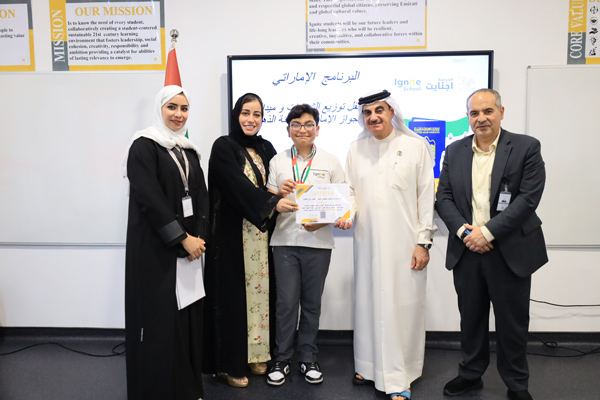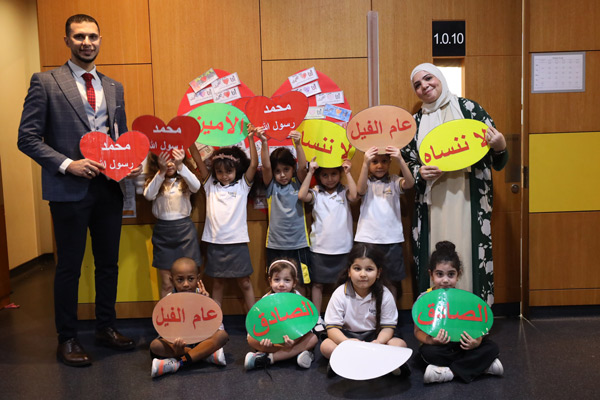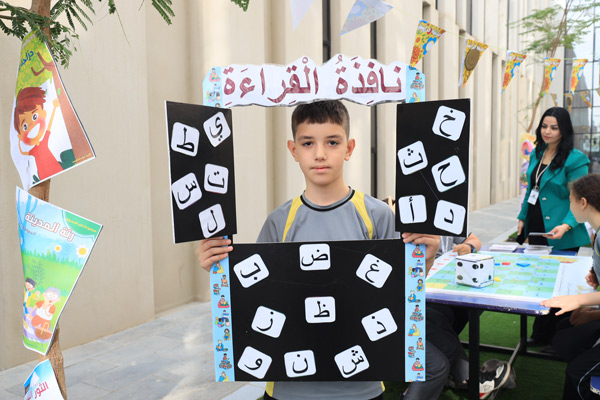Why Arabic Proficiency Matters in the Emirati Program
Arabic language proficiency in the UAE is an integral part of the school curricula and a core pillar of the Emirati program, ensuring that students have the capability and opportunity to explore and connect with their culture, succeed academically, and develop global readiness.
At Ignite School, our Emirati program is firmly grounded in Emirati national identity. Arabic plays a foundational role across every stage of your child’s development. From Pre-K to Grade 12, your child will be exposed to strong Arabic literacy that supports both educational and personal growth.
This blog explains why we view Arabic as an integral part of student success, rather than a supplementary subject.
Emirati Identity and Arabic Language
Language carries history, traditions, and values, building blocks that shape our identities as we grow. For Emirati students, Arabic runs much deeper than a means of communication; it is a cultural foundation of national pride.
From classical poetry to family traditions, the Arabic language connects young learners with the past and helps them speak confidently in the present. A connection that supports cultural understanding, emotional well-being, and identity development.
In the Emirati program, Arabic is not separated from daily learning. It is an integrated part of daily life, from Arabic curriculum UAE classes to heritage-based activities. Students participate in:
- Social studies and moral education, taught in Arabic
- Celebrations of UAE heritage and National Day
- Emirati literature and storytelling activities
- Arabic assemblies and student-led events
Fluent Arabic speakers can engage more deeply in national conversations and make meaningful contributions to Emirati society. Without this foundation, it becomes harder to preserve the culture that defines the UAE’s identity.
Ask yourself: how can future generations protect Emirati culture without knowing the language that shapes it?
How Arabic Strengthens Learning Outcomes
Language affects how students learn, with language acquisition skills providing the toolkit for young learners to take on any new subject. Strong Arabic skills support overall academic performance, especially when reading and writing are part of everyday practice.
When students are confident in Arabic, they:
- Understand and retain information better
- Write more clearly across subjects
- Engage more actively in class discussions
- Improve comprehension in both Arabic and English
Arabic learning in UAE schools is not limited to exams. It facilitates stronger learning outcomes and prepares students for a bilingual academic journey. Arabic literacy in UAE schools contributes directly to student success, not only in Arabic exams but across the curriculum.
Students who can switch between languages easily tend to be more flexible thinkers. They spot patterns more quickly, explain ideas more effectively, and write with greater structure.
The Emirati program at Ignite supports this development by building Arabic into every stage of the learning journey.
Balancing Arabic with English in Education
Students in the UAE need to grow up fluent in both Arabic and English. One gives them local depth, nuance, and understanding. The other opens international doors.
When balanced well, bilingual skills in the UAE provide students with a clear advantage in school, later in life, and in the workplace.
This balance comes from:
- Giving equal time and value to both languages
- Encouraging students to switch naturally between the two
- Reinforcing reading, writing, and speaking across both contexts
- Making sure Arabic and English are not taught in isolation
At Ignite, we help students build confidence in both languages by teaching them when and how to use each. That means knowing when formal Arabic is required, when casual speech is sufficient, and how to transition between English and Arabic with natural ease.
Supporting Arabic Learning at Home
Arabic language development doesn’t stop at the classroom door; it should play a part in everyday life. As a parent, you play a key role in building consistent exposure and practice.
Your involvement helps your child stay motivated and confident. Consistent home support is pivotal and can help reinforce what they learn in school, building healthy lifelong habits.
The parents’ role in Arabic education is vital in bilingual homes where English may dominate daily communication. When students see Arabic used in real life, they stop thinking of it as something separate from who they are. It becomes part of how they think, speak, and connect.
Even small shifts in your routine, such as switching storytime to Arabic, can make a significant difference in fluency and comprehension over a short period.
KHDA Arabic Language Policy and Curriculum Standards
The Ministry of Education and KHDA have made Arabic language proficiency a core requirement for all schools running the Emirati program.
The UAE education policy sets clear learning outcomes for Arabic at every grade level. The policies strengthen training programs for Arabic teachers so instruction is consistent and effective, and also expand Arabic teaching across more subjects. The language is now an integral part of students’ daily experience, rather than a standalone class.
At Ignite School, we follow national guidelines while tailoring our support to meet the needs of our students. Native speakers are guided to grow in depth and mastery, while non-native speakers build confidence with grammar, vocabulary, and comprehension. A combined approach that meets policy goals while supporting every student’s unique language journey.
Digital Tools for Learning Arabic
Today’s students benefit from digital tools that support Arabic language teaching methods in Dubai.
Technology is playing an increasingly significant role in Arabic instruction. Across UAE schools, Arabic learning apps and online platforms are helping make language study more engaging and accessible.
Popular tools include:
- Interactive Arabic games
- Vocabulary flashcard apps
- Voice recognition tools for pronunciation
- Storytelling platforms with guided reading
- Blended learning programs with live feedback
These resources support different learning styles and provide instant reinforcement.
At Ignite, students use technology in Arabic classes to:
- Practice grammar and spelling
- Build speaking confidence through voice tools
- Access stories and content tailored to their level
Arabic learning apps in the UAE are particularly useful for families seeking to support their children’s fluency outside of school hours. They make daily practice easier and often more fun.
Overcoming Barriers to Proficiency
Arabic learning doesn’t come easily to every student. Some struggle with motivation. Others feel more comfortable in English. Many don’t use Arabic outside of class, which slows progress.
Low confidence can also play a role, especially for learners who compare themselves to native speakers. But these challenges in Arabic learning in the UAE aren’t permanent. They shift when students feel supported.
Arabic lessons become more effective when the content connects to students’ interests and lives. Providing students with more opportunities to speak and interact in Arabic, beyond drills and tests, helps them develop genuine fluency. Project-based learning, conversational practice, and consistent writing support all contribute to stronger outcomes.
At Ignite, we take a flexible approach. We meet students where they are, build confidence through consistency, and give them tools to move forward at their own pace.
Securing the Future of Arabic in Education
The future of Arabic in UAE schools depends on what we do today. The Emirati program is built around national identity, but that identity will only be preserved if the language is protected.
Students need more than exam preparation. They need chances to use Arabic meaningfully across subjects and settings, supported by a concerted effort to promote the Arabic language.
Arabic language proficiency gives students the tools to speak confidently, think clearly, and participate in the future of their country.
The earlier children build strong Arabic foundations, the more likely they are to carry those skills into adulthood.
To build long-term fluency, schools and families should work together to:
- Promote consistent use of Arabic inside and outside the classroom
- Reinforce the cultural and academic value of the language
- Support reading, writing, and speaking across all levels
- Encourage positive attitudes toward bilingual education
How Schools & Families Can Strengthen Arabic Today
Arabic language proficiency in the UAE will grow stronger when schools and families work together. To experience Arabic as a living language, students need consistent opportunities to use Arabic in class, at home, and in the community.
The future of Arabic in UAE schools depends on daily practice and shared responsibility. Together, we can promote the Arabic language in the UAE and give every student the confidence to thrive in both Arabic and English, both for today and for the future.
At Ignite School, our Emirati program combines national standards with flexible teaching methods to help every child build lasting fluency. We provide native speakers with the right space to deepen their skills and non-native speakers with the support to grow in confidence.
If you’re a parent or guardian looking to strengthen your child’s Arabic literacy, or want to learn more about how our Emirati program supports Arabic language proficiency in the UAE, Book a tour today.




